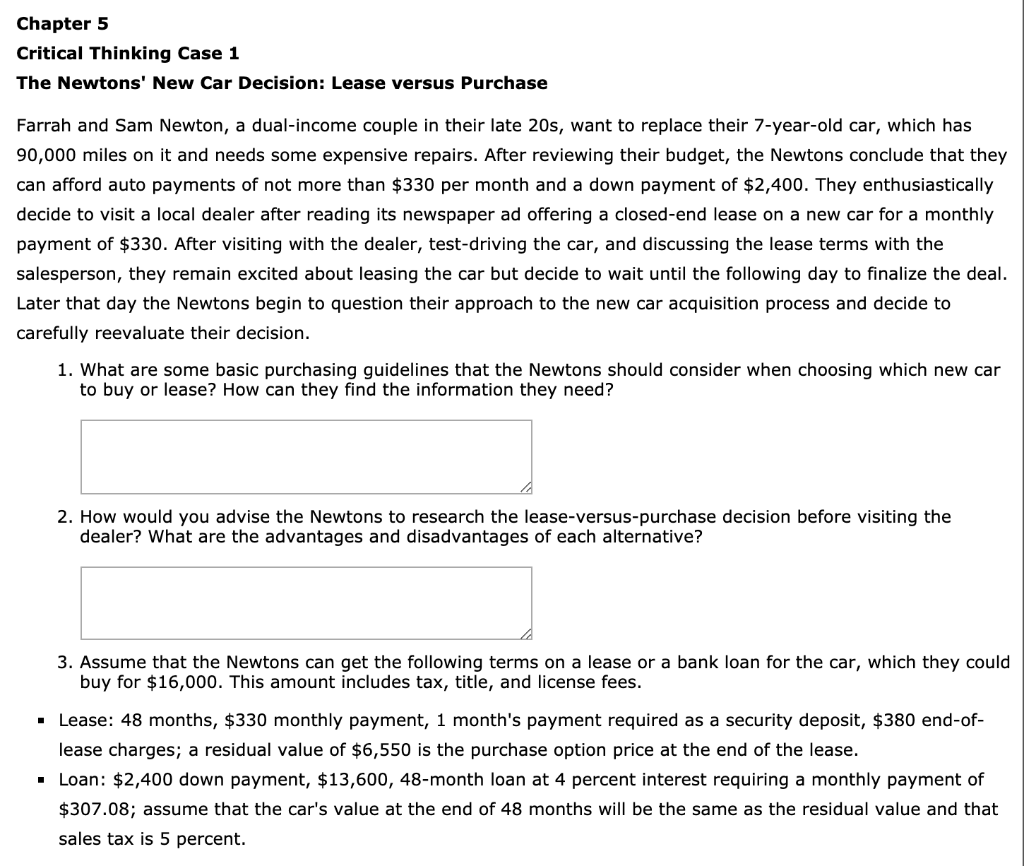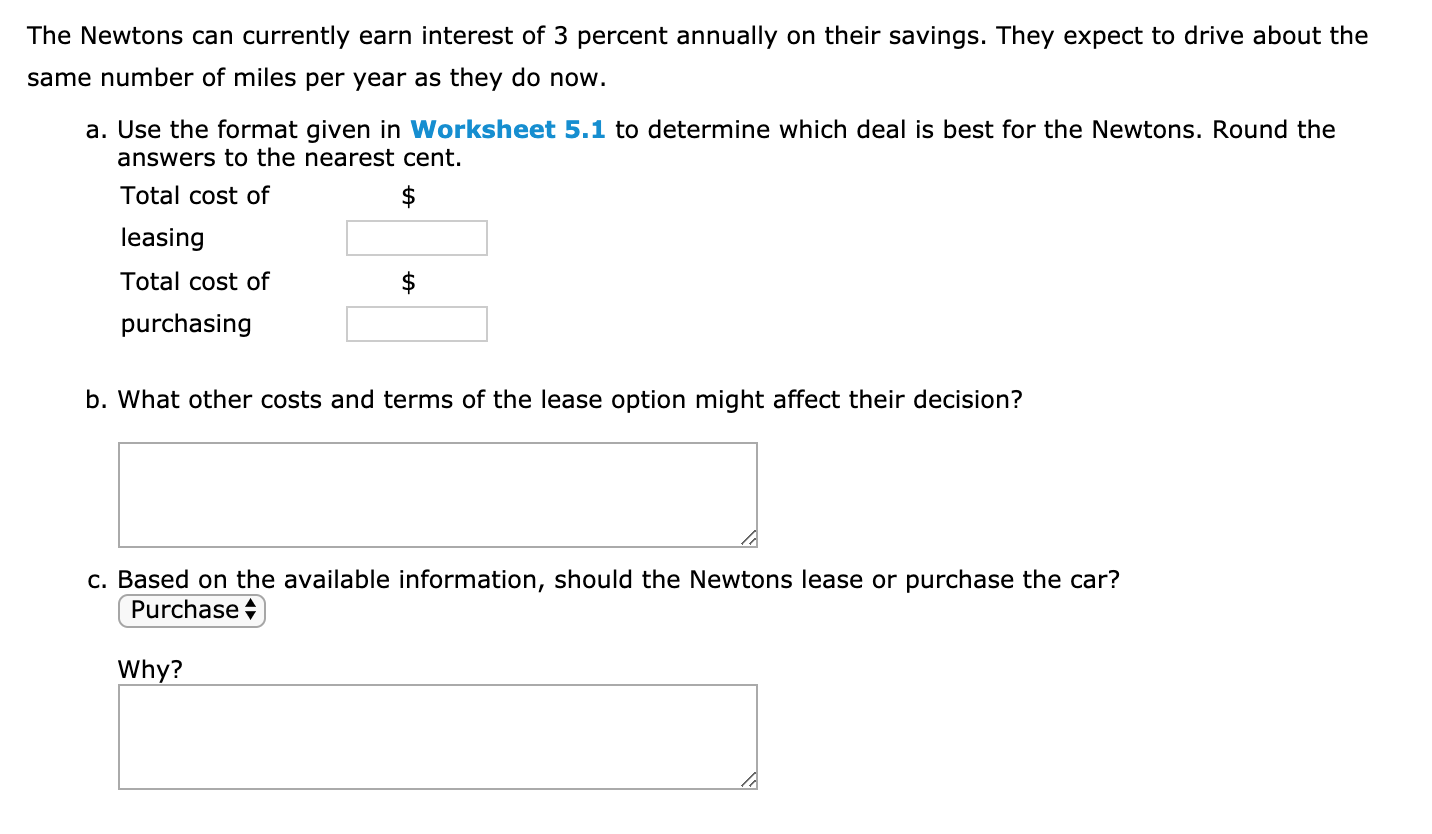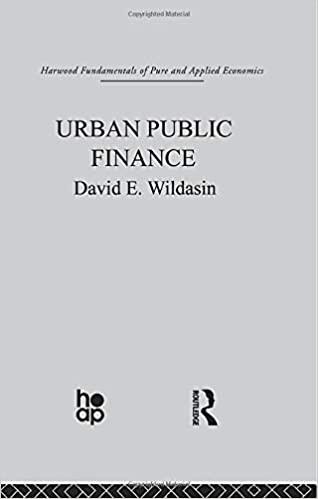THX!!! PLZ!!


Chapter 5 Critical Thinking Case 1 The Newtons' New Car Decision: Lease versus Purchase Farrah and Sam Newton, a dual-income couple in their late 20s, want to replace their 7-year-old car, which has 90,000 miles on it and needs some expensive repairs. After reviewing their budget, the Newtons conclude that they can afford auto payments of not more than $330 per month and a down payment of $2,400. They enthusiastically decide to visit a local dealer after reading its newspaper ad offering a closed-end lease on a new car for a monthly payment of $330. After visiting with the dealer, test-driving the car, and discussing the lease terms with the salesperson, they remain excited about leasing the car but decide to wait until the following day to finalize the deal. Later that day the Newtons begin to question their approach to the new car acquisition process and decide to carefully reevaluate their decision. 1. What are some basic purchasing guidelines that the Newtons should consider when choosing which new car to buy or lease? How can they find the information they need? 2. How would you advise the Newtons to research the lease-versus-purchase decision before visiting the dealer? What are the advantages and disadvantages of each alternative? 3. Assume that the Newtons can get the following terms on a lease or a bank loan for the car, which they could buy for $16,000. This amount includes tax, title, and license fees. Lease: 48 months, $330 monthly payment, 1 month's payment required as a security deposit, $380 end-of- lease charges; a residual value of $6,550 is the purchase option price at the end of the lease. Loan: $2,400 down payment, $13,600, 48-month loan at 4 percent interest requiring a monthly payment of $307.08; assume that the car's value at the end of 48 months will be the same as the residual value and that sales tax is 5 percent. The Newtons can currently earn interest of 3 percent annually on their savings. They expect to drive about the same number of miles per year as they do now. a. Use the format given in Worksheet 5.1 to determine which deal is best for the Newtons. Round the answers to the nearest cent. Total cost of leasing Total cost of purchasing b. What other costs and terms of the lease option might affect their decision? c. Based on the available information, should the Newtons lease or purchase the car? Purchase Why? Chapter 5 Critical Thinking Case 1 The Newtons' New Car Decision: Lease versus Purchase Farrah and Sam Newton, a dual-income couple in their late 20s, want to replace their 7-year-old car, which has 90,000 miles on it and needs some expensive repairs. After reviewing their budget, the Newtons conclude that they can afford auto payments of not more than $330 per month and a down payment of $2,400. They enthusiastically decide to visit a local dealer after reading its newspaper ad offering a closed-end lease on a new car for a monthly payment of $330. After visiting with the dealer, test-driving the car, and discussing the lease terms with the salesperson, they remain excited about leasing the car but decide to wait until the following day to finalize the deal. Later that day the Newtons begin to question their approach to the new car acquisition process and decide to carefully reevaluate their decision. 1. What are some basic purchasing guidelines that the Newtons should consider when choosing which new car to buy or lease? How can they find the information they need? 2. How would you advise the Newtons to research the lease-versus-purchase decision before visiting the dealer? What are the advantages and disadvantages of each alternative? 3. Assume that the Newtons can get the following terms on a lease or a bank loan for the car, which they could buy for $16,000. This amount includes tax, title, and license fees. Lease: 48 months, $330 monthly payment, 1 month's payment required as a security deposit, $380 end-of- lease charges; a residual value of $6,550 is the purchase option price at the end of the lease. Loan: $2,400 down payment, $13,600, 48-month loan at 4 percent interest requiring a monthly payment of $307.08; assume that the car's value at the end of 48 months will be the same as the residual value and that sales tax is 5 percent. The Newtons can currently earn interest of 3 percent annually on their savings. They expect to drive about the same number of miles per year as they do now. a. Use the format given in Worksheet 5.1 to determine which deal is best for the Newtons. Round the answers to the nearest cent. Total cost of leasing Total cost of purchasing b. What other costs and terms of the lease option might affect their decision? c. Based on the available information, should the Newtons lease or purchase the car? Purchase Why








